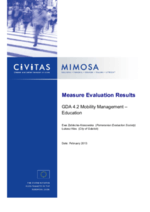Encouraging sustainable school trips
Summary
In Gdansk, more and more parents bring their children to school by car, which significantly contributes to congestion, pollution and safety risks during peak times. To address this situation, the city decided to run an educational programme to encourage school children and their parents to opt for more sustainable modes.
Implementing sustainable mobility
As part of the city’s efforts towards sustainable mobility, Gdansk is running a series of educational activities to change mobility habits of daily trips to school among children and their parents. The rapid rise in parents who drive children to school is detrimental to the children’s health and contributes significantly to congestion during peak times. Another problem is an increase in accidents near schools. The goal of the measure is to: • Raise awareness of transport issues among children and their parents; and • Encourage the use of sustainable modes. More precisely, Gdansk wants to make school children and their parents aware of health and safety issues, their carbon footprint and problems of congestion and pollution. The city hopes that greater awareness will lead children and their parents to reflect on their transport choices and switch to sustainable modes. To this end, Gdansk decided to develop educational tools, communication and campaign materials.
The measure “Mobility Management – Education” aimed to encourage more sustainable transport behavior by schoolchildren by two combined approaches. The first one was related to smaller educational actions and games on sustainable transport for pupils at their schools. The second one, which was the most important for the measure realization, was the pilot implementation of so-called ‘Walking Buses’ (WB).
Progress
Initial discussion with Local Authority showed urgent need for residents and children in area to raise knowledge of traffic safety before implementing walking buses. It was done through different actions preceding WB implementation. • Issue of an interactive computer program on DVD “Cyclist`s Handbook” (1000 copies), which helps in learning the principles and regulations in cycling. • An education campaign “Return Home Safely” together with the daily local newspaper „Polska The Times - Dziennik Bałtycki • Safety action “Children safe on road” including article promoting the idea of Walking Bus in the most popular newspaper ” Polska The Times - Dziennik Bałtycki” • Issue of a special educational brochure „Child Safe on Road" (40000 items) attached to the newspaper as the attractive guide for children and parents • Art competitions "Wise Transport - Better Life" and "Transportation of the future", „Stop Vandalism” organized in 2010, 2011 and 2012 (about 400 children took part in those art competitions) • A number of workshops for children promoting sustainable mobility (during European Mobility Week events 2010, 2011 and 2012), workshops at schools on mobility, promoting cycling among children and distribution of promotional materials • Workshop on safety in public transport for school children in the bus depot. • Preparation of lessons outline for traffic education lessons.
The implementation of the WB initiative required a long process of persuading the schools and parents to take part in this pilot. The program was implemented in 2012 in six pilot schools specified by Municipal Education Department. The first step was to organize workshops in schools for teachers and parents. Then in 3 schools Walking Buses groups were formed within pupils from second grade of primary school. The “Walking Buses” groups started working and continued until today. The children were equipped with, high-visibility accessories, key rings, t-shirts with logos, fleece jackets, rainproof jackets, mascots with the “Walking Buses” logo and baseball caps.
Outcomes
Key-results, extracted from the evaluation between January 2012 and June 2012 were: • The reduction of school-home trips by cars was over 20% decrease of children driven to school and about 12% decrease of children driven from school five times a week. • More than 95% parents who took part in WB considered this a good idea and were satisfied with their children’s participation. This result means that this group of parents will be ready to recommend and popularise Walking Bus. • The increase of teachers ready to support Walking Buses initiative was +3%. The baseline data showed that more than 70% of teachers believe that WB is a good or very good idea. Finally the idea was promoted at the end of school year 2012 by „Walking to School” competition for primary school pupils. The children were given pedometers as a reward for participation in the action. In each school, the classes where pupils covered the greatest distance in steps on their way to school received personal weather stations for weather observations as an award.
Currently the “walking buses” program is still being realized in pilot schools. The City Education Department is preparing an extensive study to examine the current number of “walking buses” operating in Gdansk and planning additional information and awareness rising campaign. The measure may be easily replicated in other cities. The key issue for the measure`s success in fruitful cooperation with school head teachers and teachers who should keep promoting “walking buses” as a good alternative to getting to school by car and facilitate meetings with parents.








